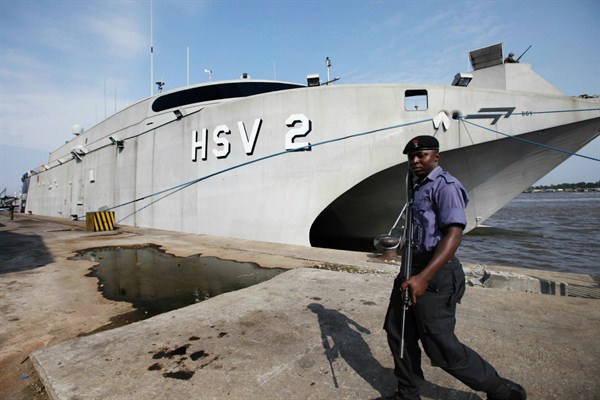Piracy in Africa brings up images of Somalia and its neighbors in the Horn of Africa, where maritime security has been an issue for years. On the other side of the continent, West African countries enjoy far more developed governmental structures and security tools and should, in theory, be able to keep piracy at bay. Yet piracy is significantly decreasing in Somalia, while it is growing in the Gulf of Guinea. According to the International Maritime Bureau, there was just one attempted attack in Somalia in the first nine months of 2016, whereas 31 incidents of piracy were reported off the coast of Nigeria from January to September, 12 more than in the same period last year.
Thirty-eight out of 54 African countries have a maritime border, and piracy in West Africa runs from Senegal in the north to Angola in the south—more than 3,700 miles of Atlantic coastline. The stakes of piracy in West Africa are clear not only for the continent, but the wider world. The major difference with the Horn of Africa is that the Gulf of Aden is a transit area, whereas the Gulf of Guinea is a destination. For the countries of the Gulf of Guinea basin, a major hub for shipping, the costs are high in terms of economy and trade. The region possesses the most important oil reserve on the continent, equal to 5 percent of the worldwide stock, 90 percent of which is exported. The countries along the Gulf of Guinea also possess huge fishing and mining resources, which are transported every day to Europe, Asia and America.
Armed groups operate throughout the Niger Delta, where most of the oil is extracted. Almost all of their attacks are against oil tankers, seizing their cargo and selling it illicitly on the Nigerian coast. According to Chatham House, these attacks represent almost $1 billion of losses each year, just for Nigeria. The Gulf of Guinea is also known for drug trafficking, with 20 to 40 tons of cocaine coming from South America each year, and illegal fishing that accounts for 40 percent of the fishing activity in the area.

